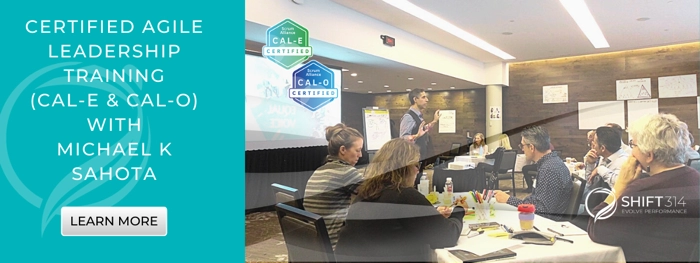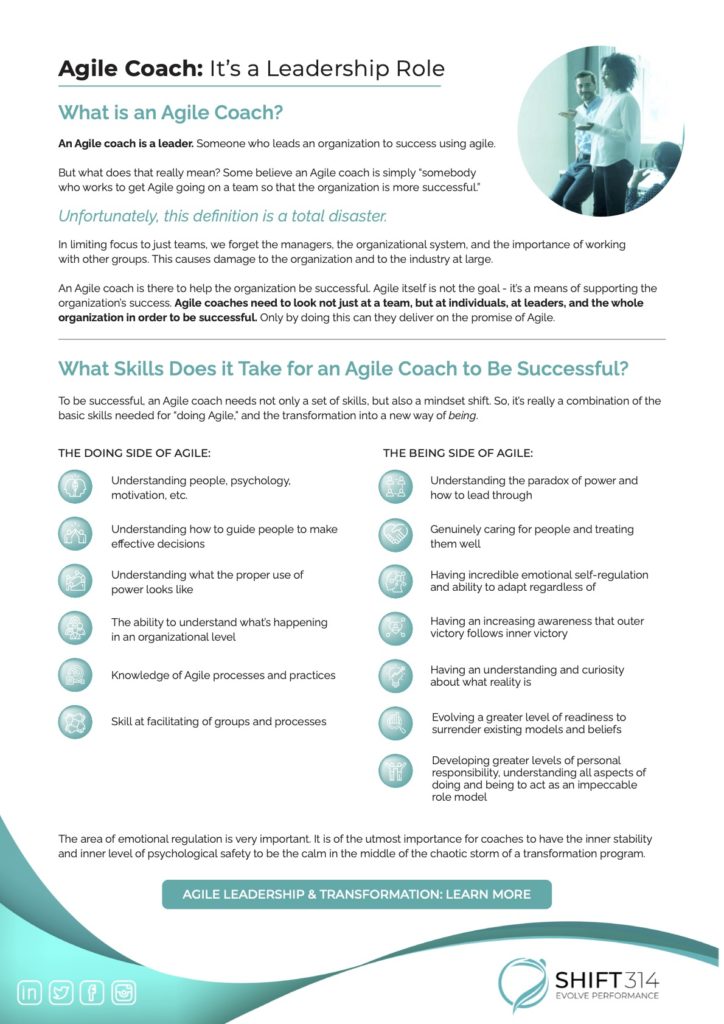What is an Agile coach? If we boil it all down, an Agile coach is a leader. It is someone who leads an organization to success using agile.
But what does that really mean? A lot of people in the industry have been conditioned into believing that an Agile coach is simply “somebody who works to get Agile going on a team so that the organization is more successful.”
Unfortunately, this definition is a total disaster. At the very least, it’s highly problematic. Sadly, it’s also the industry standard definition.
The problem is, most people just focus on the team perspective. “How can we get Agile working in this one team?” But in limiting focus to just teams, we forget the managers, the organizational system, and the importance of working with other groups. This causes damage to the organization and to the industry at large.
Here’s what most people miss: an Agile coach is really there to help the organization be successful. Agile itself is not the goal–it’s a means of supporting the organization’s success. Agile coaches need to look not just at a team, but at individuals, at leaders, and the whole organization in order to achieve success. Only by doing this can they actually deliver on the promise of Agile.
An Agile Coach Must Be an Agile Leader

What I know from my journey as a successful Agile coach is that it takes time. It takes an ongoing commitment to become a truly effective Agile coach.
For many years, I went to conference after conference, meetups, coach camps, all sorts of things. And you know what happened? The “doing” side of the equation, of learning skills, techniques, and ways of interacting, improved in very beautiful ways.
The side effect of that was I had this realization, “What about me? What about how I’m showing up? What about filling the gaps in my leadership?” Because if you look at most Agile coaches, there are often big challenges there–the “Being Agile” side that I mentioned earlier.

I looked at some behavior traits that I wanted to see in myself, such as:
- A high level of curiosity
- A deep level of compassion and caring for others
- Extraordinary patience and listening skills
- Being emotionally clear most of the time or all of the time
I began a path of transformation to work on developing those myself.
Because here’s the deal: if we want to create an Agile environment, which is about a learning culture, how can we inspire anyone else to grow through their limitations unless we’re doing it with ourselves first? It’s really a prerequisite of a great Agile coach to focus on both sides of these.
An Agile coach actually needs to be an Agile leader. They themselves need to hold the transmission of what Agile really is–not just the doing, but the Agile way of being. When they lead in an Agile way, they can model that for everyone around them: the people on the teams, the managers, and the others who hold power in the organization. That’s what inspires change.

It’s About Leading Through Influence
A key success factor of an Agile coach is the ability to lead through influence. It’s about how to lead without power, budget or authority. A successful Agile coach can influence the system to unblock resistance. Their leadership is essential for creating motivated and engaged people who deliver quickly.

Another aspect is to help managers learn how to share power and lead through influence. The transmission of an Agile coach is to be a role model, facilitating and guiding a new way of working and being.
In Scrum 101 we talk about autonomous teams and managers giving up power, but real life is not so simple. The complex realities of the workplace demand a more nuanced understanding of the paradox of power and how to lead in a different way.
What Skills Does it Take for an Agile Coach to Be Successful?
This question alone is a trap. To be successful, an Agile coach needs not only a set of skills but also a mindset shift–a different way of being. So, it’s really a combination of the basic skills needed for “doing Agile,” and the transformation into a new way of being.
The “Doing” side of the Agile Coach requires:
- Understanding people, psychology, motivation, etc.
- Understanding how to guide people to make effective decisions
- Understanding what the proper use of power looks like
- The ability to understand what’s happening in an organization and what to do about it.
- Knowledge of Agile processes and practices
- Skill at facilitation of groups and processes

On the “being” side, an Agile coach needs to show up with an evolved mindset. We can think about Agile as pointing towards a much more evolved culture (“green” or “teal” in the Frederic Laloux model).
The “Being” side of the Agile coach:
- Understands the paradox of power and how to lead through influence
- Genuinely cares for people and treats them well
- Has incredible emotional self-regulation, can adapt no matter what’s going on around them.
- Has an increasing awareness that external challenges are linked with internal ones and that outer victory follows inner victory.
- Has an increasing understanding and curiosity about what reality is.
- Is evolving a greater level of readiness to surrender existing models and beliefs.
- Is developing greater levels of personal responsibility, knowing impact and cleanup in all aspects of doing and being to act as an impeccable role model.
The area of emotional regulation is very important. It is of the utmost importance that coaches have the inner stability and inner level of psychological safety to be the calm in the middle of the chaotic storm of a transformation program. This is important in order to keep everyone on track–for guiding people and inspiring them to move forward. There are a lot of inner shifts in the being of an Agile coach that need to go along with the outer-world skills.

Agile Coach vs Scrum Master
A question I often hear is, “What is the difference between an Agile coach and a Scrum master?” There’s actually a big difference. A Scrum master works with one specific team. An Agile coach needs to understand how to create success through Agile to help an organization achieve its goals.
So, an Agile coach is focused on the whole organizational system–a much broader view than a Scrum master. Like a Scrum master, an Agile coach works with teams, but they also work with the managers and leadership, other departments and groups, and is partly responsible for the transformation program itself.
Organizational Benefits of an Agile Coach
It is almost impossible to get Agile working without a good Agile coach. An industry best practice is to provide team training followed by on-the-job coaching so that people get the support they need to integrate and learn complex skills. However, organizational success requires more than just working with teams. Effective coaches also work with the organizational system and the leadership to support the shift from traditional management to more fluid and adaptable ones.
Agile Coach Job Responsibilities
So, keeping this expanded view of what an Agile coach is in mind, what are the job responsibilities of an Agile coach?
Here are some of the responsibilities Agile coaches have:
Training staff

Good Agile coaches also do team-level training on Agile basics. While there are excellent specialists who just do training, it is often helpful to have an Agile coach that is working directly with people in your organization. This allows for additional context and any needed customizations to enhance the learning experience. It also helps them establish credibility as an expert by having a chance to interact and support people.
Team level training very naturally transitions into project launch activities to prepare user stories, backlogs and release plans. It is very important to have someone on hand who can guide the team effectively in getting project teams set up well.
Running an Agile transformation program
Part of being an Agile coach is understanding how to set Agile up and how to involve stakeholders. Agile coaching means governing an Agile transformation program and helping take everyone on the journey–not just the teams, but the whole organizational system. This includes working with the management, as well as keeping good relationships with other departments.
Supporting role changes
Another part of running an Agile transformation program will be helping people in specific roles go through a shift. Agile transformation requires changing of roles–so part of an Agile coach’s responsibility is to help people understand the skills needed and adapt. Working with teams, helping them get set up. Facilitating project kickoffs so that teams can launch into an Agile way of working. Helping them get started, even sitting down with them in their daily work to make sure that they’re doing all the right things and learning how to collaborate with each other.
Skills training

An Agile coach will also help teams on a just-in-time basis with any skills training that they need. This could mean training employees in collaboration and new ways of working together. It could also mean you or someone else giving employees education on specific technical practices such as pair programming, test-driven development, automated acceptance testing, or automated builds to support the teams developing the software craftsmanship side of the equation that’s often needed in a software development context.
Working with leaders
Agile coaches also engage with the leadership of the organization to help them understand that an Agile transformation can’t be led by Agile coaches. Organizational transformation is not delegable. An Agile coach must help leaders understand their roles in the Agile shift and help them with the skills, mindset, and journey that they need in order for them to show up as Agile leaders.
How to Become an Agile Coach
Right now, there are a few ways to become an Agile coach.
- Declare “I’m an Agile coach!”
- Take a two-day certification and declare, “I’m an Agile coach!”
- Commit to learning the skills necessary for “Doing Agile,” and going through the often arduous, but deeply rewarding, mindset shift necessary to “Be Agile.”
The term “Agile coach” is actually a bit of a misnomer, because there are so many other roles that an Agile coach needs to play. For example, an Agile coach must also be a:
- Mentor
- Facilitator
- Guide
- Subject matter expert
- Master of organizational change
- Leader
A successful Agile coach is a master of many things.

However, some people stay in the box of “coach,” to their own detriment. They think, “If I’m going to be an Agile coach, I need coaching skills.” They go to ICF programs, but those are life coaching skills, which aren’t as relevant to the actual responsibilities of an Agile coach.
In order to learn the coaching aspect of the job, I’ve found that the best way is to go through actual coaching sessions yourself. I also suggest reading “The Coaching Habit” by Michael Bungay Stanier, which is where I learned one-on-one coaching.
Next Steps for Agile Coaches
For Agile coaches wishing to take the next step towards creating successful Agile transformations, we’ve created trainings to support an upskill in:
- Unblocking resistance
- Tactics to lead organizational change
- A step by step playbook to unlocking your Agile transformation
- Leading through influence, a path of evolutionary leadership to support your growth as a powerful leader
We have a self-paced online training in Agile Leadership, as well as an in-person version of our Agile leadership training to help people get started on the journey. Our CAL 2 program takes people further along on the journey.
Beyond that, we have the Academy of Leadership Mastery to really help people get the full mindset shift to be extraordinary leaders of change.
All of this contains the IP that we’ve created here at SHIFT314, which has the technology of consciousness. This technology offers an advanced understanding of culture, organizational systems, and leadership. This allows Agile coaches to really integrate what Agile is pointing to from a leadership and organizational perspective, much more than the limited, team-centric approach.
For Organizational Leaders: How to Find an Agile Coach

The organizational benefits of an effective Agile coach are incredible. However, when we look at the research, most Agile transformation programs are challenged or have outright failed. Very few are actually successful.
Why is this? Oftentimes people see Agile coaches as a commodity. When they see Agile coaches as a commodity, they get a commodity item–they get the lowest common denominator of skill. That’s what’s happened with the Agile coaching market in many parts of the world. Somebody says, “Hey, I know Agile,” and they put “Agile Coach” on their LinkedIn profile because they’ve been a Scrum master for a couple of years.
There’s no code of conduct at this time for Agile. There are some certifying bodies that I’m a part of, such as the Scrum Alliance. However, we’ve seen that what Agile coaches need to be successful goes far beyond what the Scrum Alliance describes for a Certified Enterprise Coach (CEC), their highest level of certification.
To facilitate a successful Agile transition, an Agile coach must have the following attributes:
- A demonstrated shift in their mindset
- A demonstrated understanding of the laws of organizational dynamics
- A demonstrated practice of showing up as an Agile leader and transmitting an evolved mindset through their way of being
- And demonstrated knowledge of how to evolve an organizational system to an Agile one
The basic minimum is to find someone who is aware of their position as an Agile coach and is striving to be an Agile leader. I know that the work we do is very different, so I can’t speak to other’s work. But I can speak to ours.
If you’re a manager interested in unlocking success with Agile, it’s important to find an Agile Coach who can unblock resistance, lead and scale high-performance teams, facilitate, and work with the whole organization. You’re in need of an Agile coach who is brilliant with the process and structures of Agile and has extensive leadership training.
You’re looking for an Agile coach who has developed an evolutionary mindset that shows the leadership capability to evolve an organization. A leader who holds the transmission of effective leadership to Be Agile. Evolutionary Leaders create engaged and motivated people who are fast, flexible and deliver results in a complex and ever-changing market. If your organization is looking to create internal capability, we offer extensive training programs beyond CAL1 & CAL2.



